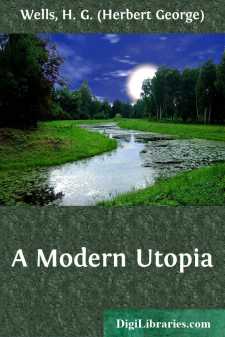Categories
- Antiques & Collectibles 13
- Architecture 36
- Art 48
- Bibles 22
- Biography & Autobiography 815
- Body, Mind & Spirit 144
- Business & Economics 28
- Children's Books 18
- Children's Fiction 14
- Computers 4
- Cooking 94
- Crafts & Hobbies 4
- Drama 346
- Education 58
- Family & Relationships 59
- Fiction 11834
- Games 19
- Gardening 17
- Health & Fitness 34
- History 1378
- House & Home 1
- Humor 147
- Juvenile Fiction 1873
- Juvenile Nonfiction 202
- Language Arts & Disciplines 89
- Law 16
- Literary Collections 686
- Literary Criticism 179
- Mathematics 13
- Medical 41
- Music 40
- Nature 179
- Non-Classifiable 1768
- Performing Arts 7
- Periodicals 1453
- Philosophy 65
- Photography 2
- Poetry 896
- Political Science 203
- Psychology 44
- Reference 154
- Religion 515
- Science 126
- Self-Help 85
- Social Science 82
- Sports & Recreation 34
- Study Aids 3
- Technology & Engineering 59
- Transportation 23
- Travel 463
- True Crime 29
H. G. (Herbert George) Wells
Herbert George Wells, commonly known as H.G. Wells, was an English writer renowned for his pioneering works in science fiction, such as "The War of the Worlds," "The Time Machine," and "The Invisible Man." Born in 1866, Wells was also a prolific social commentator and historian, whose writings often explored the impact of science and technology on society. His literary contributions have left a lasting legacy, influencing numerous authors and the genre of science fiction as a whole.
Author's Books:
Sort by:
This book is in all probability the last of a series of writings, of which—disregarding certain earlier disconnected essays—my Anticipations was the beginning. Originally I intended Anticipations to be my sole digression from my art or trade (or what you will) of an imaginative writer. I wrote that book in order to clear up the muddle in my own mind about innumerable social and political questions,...
more...
Part 1 One Wednesday afternoon in late September, Ann Veronica Stanley came down from London in a state of solemn excitement and quite resolved to have things out with her father that very evening. She had trembled on the verge of such a resolution before, but this time quite definitely she made it. A crisis had been reached, and she was almost glad it had been reached. She made up her mind in the...
more...
Locomotion in the Twentieth Century It is proposed in this book to present in as orderly an arrangement as the necessarily diffused nature of the subject admits, certain speculations about the trend of present forces, speculations which, taken all together, will build up an imperfect and very hypothetical, but sincerely intended forecast of the way things will probably go in this new century....
more...
CERTAIN PERSONAL MATTERS THOUGHTS ON CHEAPNESS AND MY AUNT CHARLOTTE The world mends. In my younger days people believed in mahogany; some of my readers will remember it—a heavy, shining substance, having a singularly close resemblance to raw liver, exceedingly heavy to move, and esteemed on one or other count the noblest of all woods. Such of us as were very poor and had no mahogany pretended to...
more...
Recently I set myself to put down what I believe. I did this with no idea of making a book, but at the suggestion of a friend and to interest a number of friends with whom I was associated. We were all, we found, extremely uncertain in our outlook upon life, about our religious feelings and in our ideas of right and wrong. And yet we reckoned ourselves people of the educated class and some of us talk...
more...
CHAPTER THE FIRST THE COSMOGONY OF MODERN RELIGION1. MODERN RELIGION HAS NO FOUNDERPerhaps all religions, unless the flaming onset of Mohammedanism be an exception, have dawned imperceptibly upon the world. A little while ago and the thing was not; and then suddenly it has been found in existence, and already in a state of diffusion. People have begun to hear of the new belief first here and then...
more...
I SAW a gray-haired man, a figure of hale age, sitting at a desk and writing. He seemed to be in a room in a tower, very high, so that through the tall window on his left one perceived only distances, a remote horizon of sea, a headland and that vague haze and glitter in the sunset that many miles away marks a city. All the appointments of this room were orderly and beautiful, and in some subtle...
more...
I THE WAY TO CONCRETE REALIZATION More and more frequently does one hear this phrase, The League of Nations, used to express the outline idea of the new world that will come out of the war. There can be no doubt that the phrase has taken hold of the imaginations of great multitudes of people: it is one of those creative phrases that may alter the whole destiny of mankind. But as yet it is still a very...
more...
OF THE LEGENDARY PAST "LITTLE WARS" is the game of kings—for players in an inferior social position. It can be played by boys of every age from twelve to one hundred and fifty—and even later if the limbs remain sufficiently supple—by girls of the better sort, and by a few rare and gifted women. This is to be a full History of Little Wars from its recorded and authenticated beginning until...
more...
CHAPTER I. INTRODUCES MR. LEWISHAM. The opening chapter does not concern itself with Love—indeed that antagonist does not certainly appear until the third—and Mr. Lewisham is seen at his studies. It was ten years ago, and in those days he was assistant master in the Whortley Proprietary School, Whortley, Sussex, and his wages were forty pounds a year, out of which he had to afford fifteen shillings...
more...











